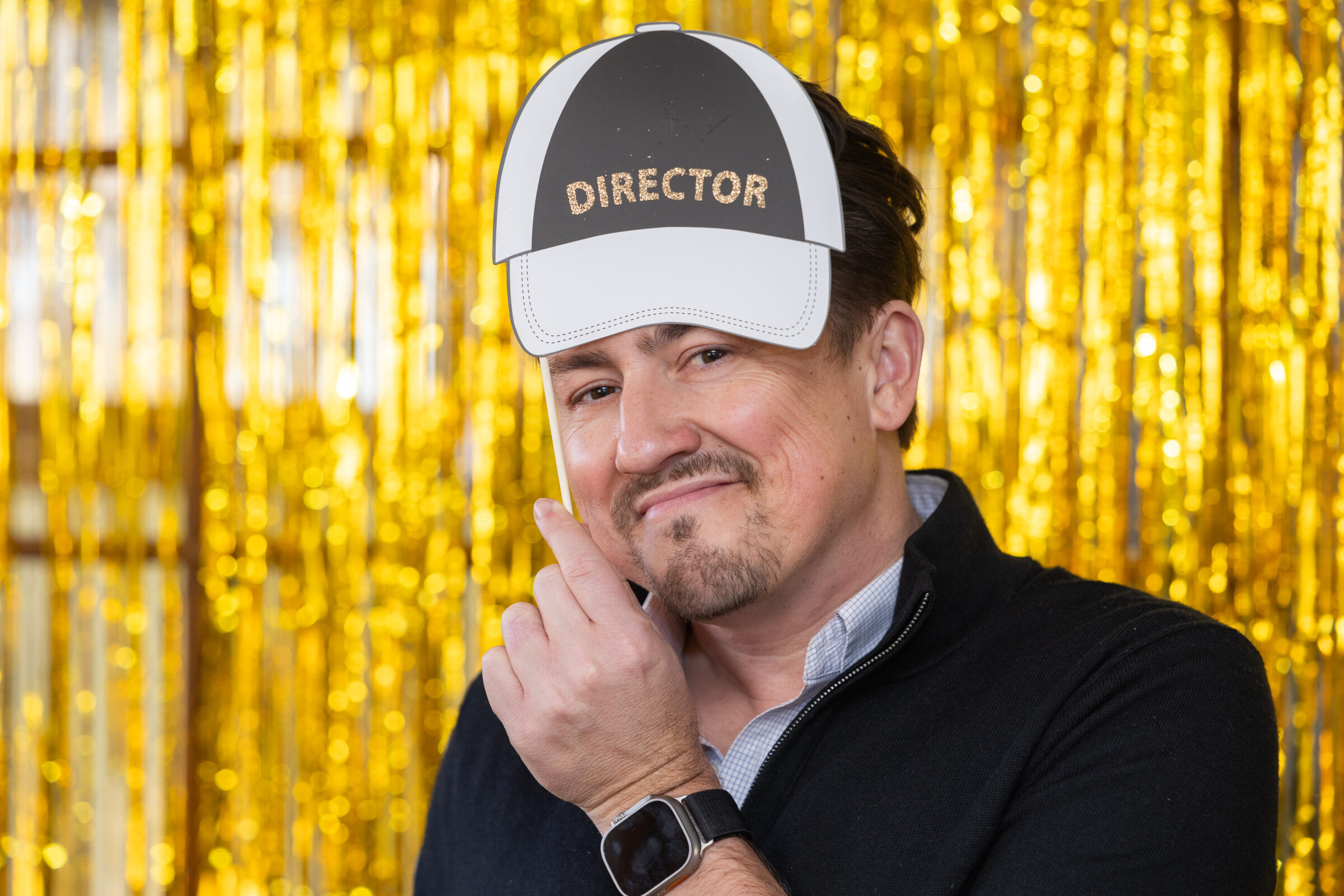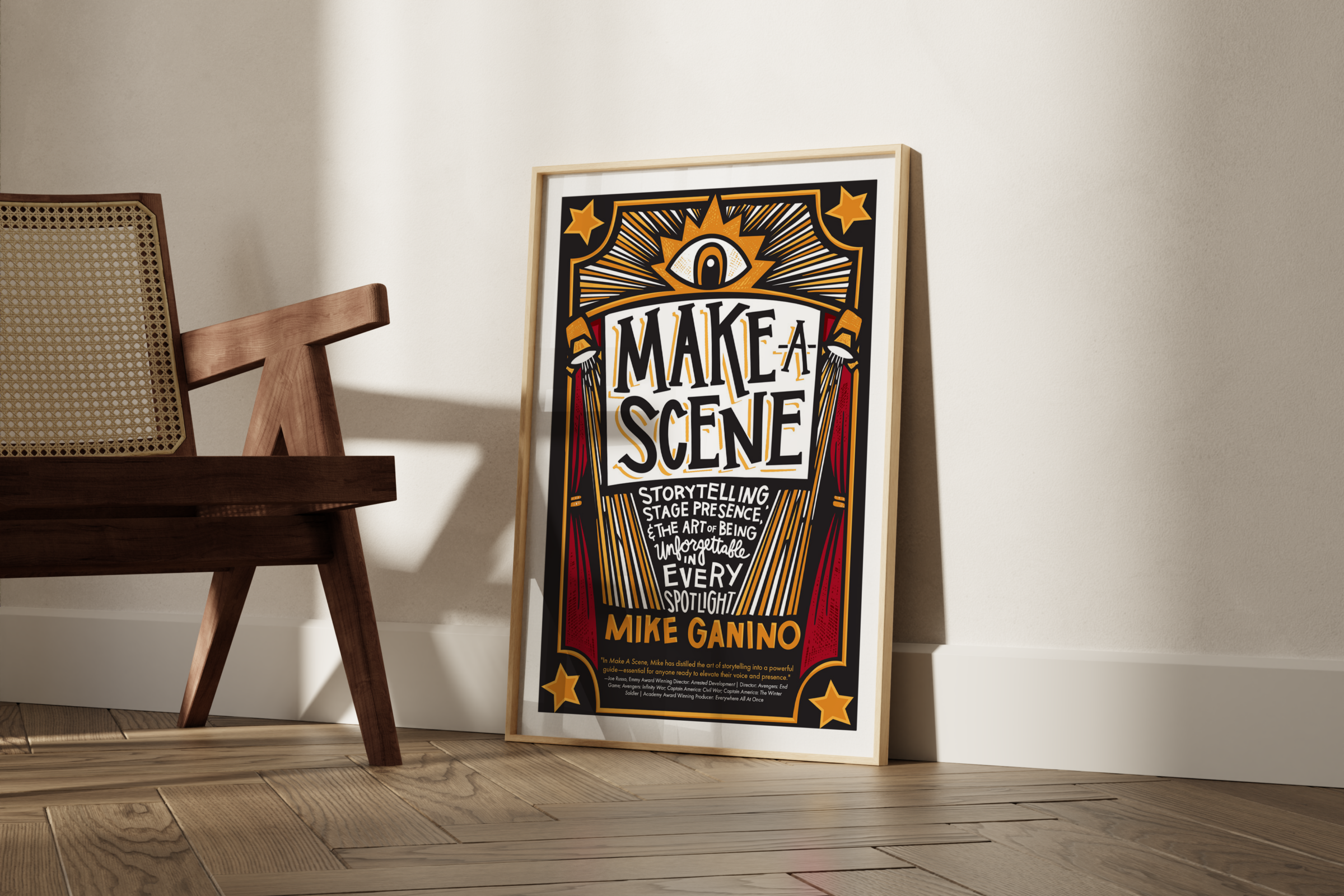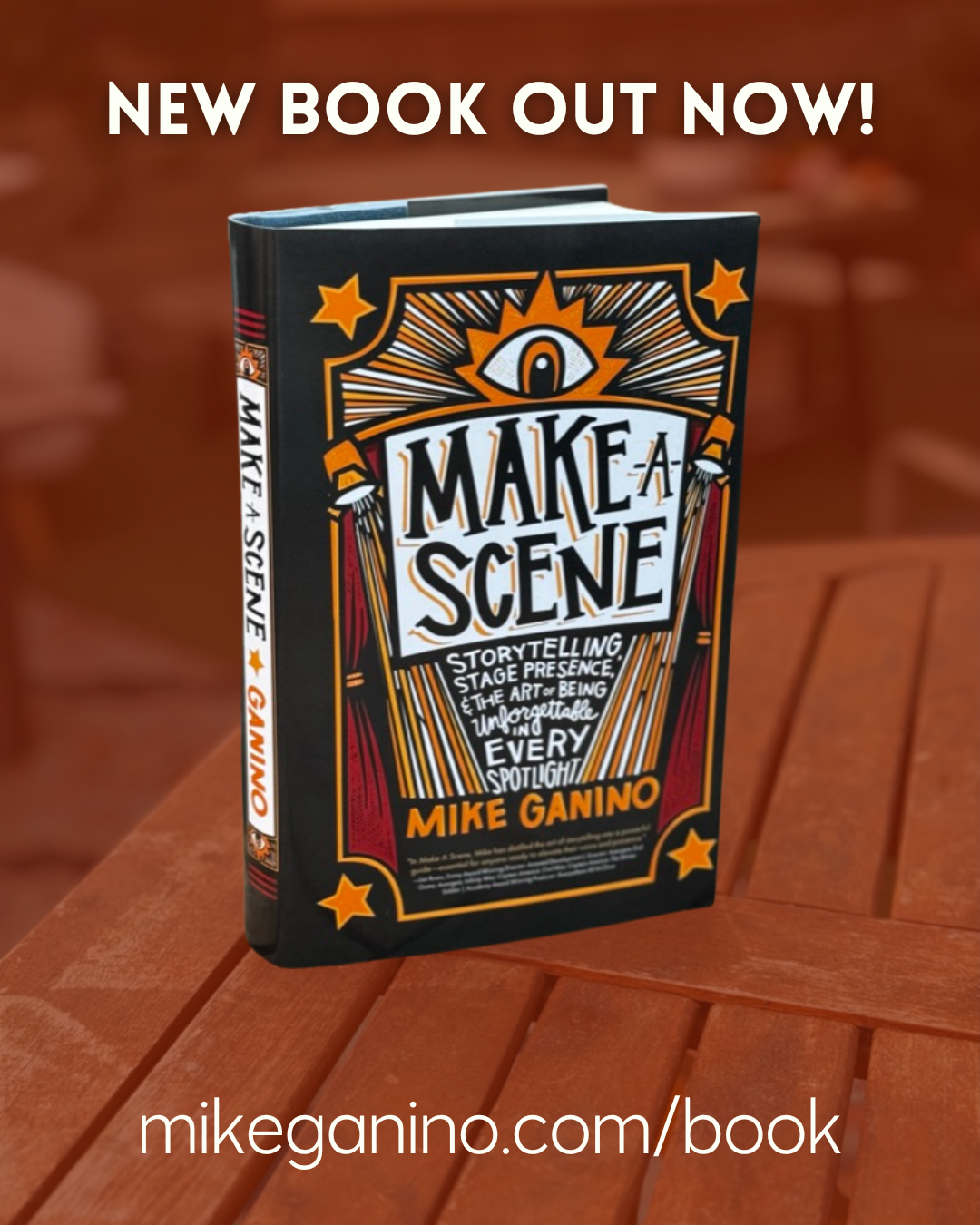What does it take to become a great storyteller on stage?
“For some reason, this night, I was just not in a good head space about standup. At the last minute, I switched and told a story and got a reaction that was far superior than what I was getting with my adequate standup.”
Margot Leitman is an award-winning storyteller, best-selling author, speaker and teacher originally from Matawan, New Jersey.
She has written for NBC, DreamWorks TV, the Hallmark Channel and the PixL Network and a variety of print and online sources including Cosmo and Backstage Magazine.
Margot is a five-time winner of The Moth StorySLAM, and was the Moth GrandSLAM winner in New York City achieving the series' first ever score of a perfect 10. Her stories have been featured on NPR's “The Moth Podcast,” “Good Food,” “Unfictional,” “Strangers,” and is a frequent contributor to the popular podcast “RISK!”
She is the founder of the storytelling program at the UCB Theatre, where she has performed in dozens of shows over the years and is a frequent monologist at their flagship show “Asssscat.”
In her spare time Leitman is an amateur baker, avid yogi and a devoted bibliophile. A proud graduate of the Ithaca College Theatre Department, Leitman now resides in Los Angeles.
Margot Leitman: It would, It would be at a standup show in New York that I, when I was trying to figure out what I wanted to do with my life, and I knew I didn't wanna do standup anymore, and I just, instead, I think I, they were giving in, in New York, at least at the time, you would get paid in drink tickets.
[00:00:14] Margot Leitman: Like they would give you a couple free drinks and then that's what you would get paid for the night. So I think I had them both before I went on stage. For some reason this night, probably because I was overcompensating for how much I didn't, I was just not in a good head space about standup.
[00:00:29] Margot Leitman: And then I instead at the last minute, just switched and told a story on stage and, um, got a reaction that was, you know, far superior than what I was getting with my adequate standup and uh, thought I was onto something. So that would probably be the first time I intentionally did it as a performance.
[00:00:45] Mike Ganino: That's Margot Leitman. She's an award winning storyteller and best-selling author of Long Story Short: The Only Storytelling Guide You'll Ever Need, What's Your Story? A Workbook For The Storyteller In All Of Us, and Gawky Tales Of An Extra Long Awkward Phase. She's a five-time winner of The Moth StorySLAM and was The Moth GrandSLAM winner in New York City, achieving the series first ever score of a perfect 10.
[00:01:10] Mike Ganino: Her story has been featured on NPR, in The Moth podcast, Good Food, UnFictional Strangers, and pretty much everywhere else where good stories are told. She's also the founder of the storytelling program at UCB Theater, where she's performed in dozens of shows over the years. In this episode, Margo and I talk about storytelling, how to find it, where to find it, how to tell a good one and pretty much everything else under the sun, when it comes to becoming a great storyteller on stage.
[00:01:41] Mike Ganino: And then you realized, oh wait, this is a, this is a thing. This exists. I can, I can do this. People can still laugh and it doesn't need to be a.
[00:02:18] Margot Leitman: No, I didn't realize it was a thing. Um, in fact, it wasn't really a thing. Uh, I, in fact, I was told over and over again, this isn't a thing. What are you trying to do? Um, so no, I mean, I want, there was one show I had seen that did storytelling at the time. And I watched it, and then I immediately approached him about being on it.
[00:02:38] Margot Leitman: And then I was able to get on it a few shows in, and then that was it. And then I, uh, with my friend Julia Rozzi created a storytelling show because it was so not a thing at the time. Um, I mean, and there was The Moth, I mean, it was in maybe New York and maybe, I don't remember where else it was, if it was anywhere else.
[00:02:56] Margot Leitman: I'm not like an expert on the history. And so then, we kind of started doing our show and then started doing it on the road and such, and then it, then it exploded from there.
[00:03:06] Mike Ganino: And what was that, what was that show?
[00:03:07] Margot Leitman: Show was called Strip Stories and it was really fun.
“A lot of storytelling is in the inner monologue of discovering what were you thinking at the time, or how did you justify this at the time? And put yourself in the mindset of who you were then.”
[00:03:11] Mike Ganino: Nice. So Strip Stories were, was there a theme to it or it was kind of
[00:03:15] Margot Leitman: well the whole thing is that about being, you know, like honest and, you know, stripping away all your layers. And it was, we all re uh, revolved it around like love, sex, dating, um, romance, things like that.
[00:03:29] Mike Ganino: When I think one of the things that happens for a lot of storytellers or a lot of, uh, public speakers or people that are out there, you know, in front of people talking for, for a living, is we often, I'll see in the circles I'm in in Facebook groups, people will always highlight some comedian's new Netflix special, and they'll say, oh my gosh, you gotta see this person's new show.
[00:03:51] Mike Ganino: That's what we need to be. And I always find this moment of like, ah, I don't know that that's what you need to be. Because I think it's, I think humorous storytelling is probably better. What, what is the difference between standup jokes and a humorous story?
[00:04:06] Margot Leitman: Uh, the pacing. So well, a lot actually. The pacing. You don't get, um, a laugh in stand up in the first few seconds of your set, or my God, God forbid a minute, you know, you're, you're bombing. And then the pacing of a story is you can have no laughs for minutes at a time and it's completely okay. So there's that, you know, you're used to, I mean, what real standup , uh, us real standup nerds will call LPM – LPMs, which just laughs per minute, you know, you get really into that.
[00:04:35] Margot Leitman: Uh, so, and then in storytelling there's no laughs per minute. Doesn't matter. So that's the big one. Also, the intentional jokes, the set up punchline style of standup at times. You know, I think if you come off as too jokey, jokey and storytelling, your audience will turn on you. Um, but here's a big thing is that standup doesn't necessarily have to be true.
[00:04:55] Margot Leitman: You can make up an ending for a punchline, and it's okay. But storytelling does. So there's, there's a fair amount of differences and then there's a fair amount of overlap, as well. But I would say those are the pretty main differences.
[00:05:09] Mike Ganino: You have this innate senses of kind of listening to like, where might there be humor, uh, somebody's story might be going and it's like, eh, it's not there, but it might be underneath of it.
[00:05:19] Mike Ganino: How do you, if someone's out there and they're thinking, I think this might be a funny story, but people aren't laughing at it, how would they diagnose where they might be going wrong?
[00:05:27] Margot Leitman: I think a lot of it's in the inner monologue of discovering what were you thinking at the time, or how did you justify this at the time? And put yourself in the mindset of who you were then. And that's, to me where a lot of the humor is. I just had a woman in a show telling a story. Um, she was, had a story about being completely scammed at 22 by a, you know, a man she started dating online and who, you know, scammed her out of money, et cetera.
[00:05:56] Margot Leitman: It wasn't at all funny, what happened, you know? And the first time she told her it was very, very serious. And I said, can you rewrite this with every way that you justified what was happening at 22? And she came back and it was the, the strangely like the, the laugh out loud, like belly laugh story of the class show.
[00:06:16] Margot Leitman: And it was just because she kept justifying it in her head at the time, you know? And it made, and it made a lot more sense that way to perform it in that manner because she had 10 years on what had happened and she was over it. I mean, that's the big thing, but if you're not over it, it's very hard to find the humor in it, especially if you're still, you know, going through something or not really processed it, or you don't have any closure on something.
[00:06:40] Mike Ganino: Yeah, there's that idea of, uh, the difference between having been through the therapy and coming out to share what happened versus going through therapy on stage.
[00:06:48] Margot Leitman: Oh yes. We see that all the time. Yes.
[00:06:53] Mike Ganino: It's, it's an interesting thing in, in, Long Story Short, one of the, it's really well designed by the way, to the book.
[00:06:59] Margot Leitman: Thank you. That's, that's, uh, Joyce Wang who does the, um, illustrations. Um, and I've worked with her in both of my books and did some work with her on my website and all of my branding has done with her. And she's an amazing, uh, illustrator and you should follow her on all social media and buy her work.
[00:07:16] Mike Ganino: It's, it's so fun because it's, it's exactly, sometimes books on storytelling can be so, uh, so academic and it kind of strips away the fun. And I love, I love the book because it's, it's, it gives you everything you need and it does it in a way that makes it really easy to consume. So that's,
[00:07:32] Margot Leitman: Thanks Mike. You know when, when I pitched the book, the first time when, when it went out to publishers to be sold. Um, it sold rather quickly, which was a nice surprise from my first book, my memoir that took over a year to sell, you know, as my first title. But this book, Long Story Short, sold very quickly.
[00:07:50] Margot Leitman: And what was interesting is that the first and higher offer I had was a publisher that wanted to do it as an academic textbook because I had the content written in a proposal, but I didn't have any of the design. I'm not a designer. Um, and they wanted it to be formulated as a textbook. And then, my publisher who I still work with today, uh, Sasquatch Books, wanted to do it in an artsy way that was more fit my aesthetic and the, and I ended up taking the smaller offer and wasn't significantly smaller, but to do the book in the way that I felt was true to myself.
[00:08:24] Margot Leitman: And it ended up being so rewarding because it, it was, I think it was a hit and is a hit because it is authentic. And I think the other way would've felt really just not me.
[00:08:36] Mike Ganino: I love the, I love the continuity between Long Story Short and then What's Your Story?
[00:08:40] Margot Leitman: Yeah, that's okay.
[00:08:42] Mike Ganino: It's, uh,
[00:08:42] Margot Leitman: What's The Story is good though, too. That's a good title for my next one.
[00:08:45] Mike Ganino: That should be it. It's where you look at other people and you try to figure out what is the story here and how do we tell it?
[00:08:49] Mike Ganino: I, I see it happening for you. You know what's been funny, actually, several guests on the show, I have a, there's an episode with Anthony Glio that's coming out, and he's a sommelier who also did, The Moth. Yeah, he did the moth talking about his was called, um, his was called, “Listen Here, Fancy Pants.” And it's about growing up in kind of a, a mafia family and being like a guy who wanted to be a sommelier sommelier and wear like bow ties.
[00:09:12] Mike Ganino: And, um, he was talking about his role. Uh, he gets, he does like the 24 hour or 48 hour like online sommelier for the Centuria Lounge, which is the very fancy Amex lounge at airports. And if you're a member you can like email him. And he'll answer your wine questions, but it's like 48 hour turnaround. It's not like immediate.
[00:09:33] Mike Ganino: He's not an app. And so he was talking about all these funny, like a guy emailed him from the bathroom and was like, I'm in the bathroom on a date. Here's the wine list. What should I get?
[00:09:41] Mike Ganino: And he got it, like he got it 48 hours later and was like, uh, You probably picked something great. How did it go? And he's like, it went well, you know?
[00:09:48] Mike Ganino: And uh, and I said, Anthony, that's your, he's written 11 books. He does like a lot of the food and wine, like wine of the year kind of books. And I said, oh, your next book should be you and these emails. That's the story. So who knows what's the story? It's gonna be the third in the trilogy.
[00:10:01] Mike Ganino: You, you talk about one of, one of the things I think sometimes that people struggle with, with wanting to tell a story, especially in a speech where maybe they're, they're going to give a speech and they've been hired by a company to come in. And part of, part of the job there is to be entertaining.
[00:10:15] Mike Ganino: Like I always say to people, your job when you're a public speaker is to be helpful and to not bore them. That's our, that's our job. That's what's what the audience wants. Yeah. Like you go to, you know, Coca-Cola and help them some way, and also don't be boring. Like that's what they're praying for. I think sometimes people shy away from telling stories because they can't tell the difference between it being self-indulgent and being helpful.
[00:10:40] Mike Ganino: And I love on page 176 of Long Story Short, you say, “if your intentions are good, even if you didn't do the right thing, we'll still be on board.” And I think there's a line there about telling personal stories. What, what do you mean by “we'll still be on board even if you didn't do the right thing.”
[00:10:55] Margot Leitman: Well, we root for, I mean, every, not every, but so many TV shows are circled around a flawed protagonist. And I think that people are a little bit afraid to be that when they tell a story be yet if you actually look at what media you're consuming. It's all stories of that. So I think what I'm saying is you can be a flawed character that, you know, means well.
[00:11:15] Margot Leitman: But maybe things blow up in this person's face, in your face. Excuse me. And then we will still actually like you more because it was, things aren't always perfect. I think that when you p portray yourself as you know, I just, you know, I, I wanted to be the most perfect person and I am, no one's gonna buy into that or believe you.
[00:11:36] Margot Leitman: So, you know, the example I always give is Walter White of Breaking Bad. If you actually look back to his original in Intentions, it was to leave money for his family. Um, in the case of his, uh, impending death with cancer. You know, I mean, that was his intention, right? And if you actually really go back to that intention throughout the whole show, you can justify watching however many seasons it was for this, of this man, you know.
[00:11:58] Mike Ganino: Yeah. Yeah. We can, we can get on board with that.
[00:12:01] Margot Leitman: Yeah.
[00:12:02] Mike Ganino: What, what is it that we love about underdog so much?
[00:12:06] Margot Leitman: I I mean, it's interesting because I just listened to, not just, but a while ago I listened to one of my favorite writers, Malcolm Gladwell, talking about how he actually doesn't root for the underdog. Cause he's the, he says that it's the person expecting to win that's going to be more disappointed. And he feels, and he's like the underdog's, like, wow, I didn't know I was gonna win. Look at that. I won.
[00:12:27] Margot Leitman: But the person expecting to win is gonna be devastated if they don't . So that's his, that's his mindset, which I think
[00:12:33] Mike Ganino: I get it.
[00:12:34] Margot Leitman: adorable and funny and charming and spins it on his head and that's why I love him. But, um, for storytelling, I mean, I think he's talking more in the sports world with that, but, uh, I could be wrong. But in storytelling, I think that we need to, um, be the underdog because it's very hard for us to, to root for you in any other way.
[00:12:55] Margot Leitman: So it's basically like, what do you want? One of the rules of writing when you write fiction is, what do you want? What gets in your way, for the main character? What do they want? What gets in their way? And so if you look at it in that regard, what do I want in this story and what's getting in my way? So it can't be, I like this guy and he likes me back.
[00:13:14] Margot Leitman: There's no story there, you know? So.
[00:13:17] Mike Ganino: Yeah. It's like I was thirsty. I went and got a bottle of water. The end.
[00:13:20] Margot Leitman: And yeah. Yeah.
[00:13:23] Mike Ganino: Yeah, it's, and I think it's one of the challenges that people find when they're telling a story is they, they wanna skip over. Uh, one of the things I see a lot is that people wanna skip over all of the stuff to say, “There was a problem. I figured it out. Now here's what my great life is like.”
[00:13:37] Margot Leitman: Yeah.
[00:13:38] Mike Ganino: There's something unrelatable in there, isn't isn't it
[00:13:41] Margot Leitman: Yeah, because I think we're more interested in focusing on the problem area and have, I think the great life is probably the shortest part of the story.
[00:13:50] Mike Ganino: It sh or should be if it's a good story. Right.
[00:13:54] Margot Leitman: Yeah, yeah,
[00:13:55] Mike Ganino: What was, what was the, so I'm interested in how you went from being somebody who was, who was telling stories to realizing, wait a second, there's, there's a business here because you've worked with some really big brands.
[00:14:08] Mike Ganino: On helping them tell stories. So how did you say, Ooh, this is a thing?
[00:14:12] Mike Ganino: Or was it accidental?
[00:14:13] Margot Leitman: It was accidental. I mean, it came from performing. I have a degree in theater and dance, so I, um, you know, business is was not really my mindset. Or never really, I guess I didn't think of myself as a business person, now I very much do. But, uh, so I was a theater person for a very long time in New York City or what felt like a very long time cause it was so much struggle in there.
[00:14:36] Margot Leitman: Uh, but I think it, you know, I was live performing my show strip stories and a woman came to. Uh, it, it, uh, at the time, you know, you have to remember the market was much less saturated with storytelling shows. So this show was very, very popular because there weren't many like it at the time. And if you wanted to see storytelling, there was wasn't that many going on.
[00:14:56] Margot Leitman: This is like 2007. So, um, uh, a woman came to see my show that was, uh, a VP, I believe at the time of a large advertising agency, and wrote to me and said, you know, I think that this agency would be able to, needs to be able to tell stories better. We basically give PowerPoints and that's it. And we don't know how to tell story and it's such an in, you know, important part of advertising too understand story.
[00:15:23] Margot Leitman: And so I went there and then it went really well. And then I kept, um, doing workshops at this ad agency and then they started flying me to other, um, divisions of it in the country. So this is when I was still in New York. So I would go, there was a period of my life where I would teach one night in New York and then fly LA then fly to San Francisco and then fly back all within a week.
[00:15:45] Margot Leitman: Um, and that was wild. And then I worked pretty soon after that for a theater company in Australia where I did pretty much like a residency. I was there for about six weeks. And um, and then I came back from there and it was growing a lot.
[00:16:02] Margot Leitman: And I, that's around the time we moved to LA because I felt like the way that my business was growing, it didn't really matter where I was based out of. And New York is, um, you know, I was married. We're thinking about maybe having a family someday and such, and it's just a, for us, it it was, it was not as realistic to stay in Manhattan and do that for us.
[00:16:23] Margot Leitman: Some people but, um,
[00:16:24] Mike Ganino: I have a friend who, who was like, yeah, we lived, we had to move from New York because the only place for the baby was if I unplugged the oven and turned that into the bed. Because the New York apartments are so small.
[00:16:34] Margot Leitman: Yeah. And our oven never worked, so that would've been a good spot. Uh, ours was always breaking mid cooking like a large roast and not realizing it until the end. Yeah. So that's about, that's the beginning stages. And then it grew. I mean, um, then we've, we lived in LA and, and I sold a memoir, um, which took up, you know, a, a while of, you know, a year or so of my life to write that.
[00:16:57] Margot Leitman: Um, which was, you know, all true stories called Gawky Tales Of An Extra Long Awkward Phase. And then at that, after that came out, um, uh, I think I, I can't even remember my corporate, you know, I was doing a lot of corporate and public speaking and stuff, and then I decided to write Long Story Short, and then, you know the rest is history.
[00:17:18] Mike Ganino: The rest is history. You've done it, you've done it all. So where, when you were, when you were, uh, starting to teach, how did you come up with the idea to say to Upright Citizens Brigade, “Hey, we need a storytelling curriculum here. We need, this is the thing.
[00:17:32] Margot Leitman: I, you know, I skipped over that, that happened in New York. Um, I came to them and I, you know, I, I. I had a small course that I taught, um, independently. My friend, uh, Becky Donahue one day said to me, have you ever thought about teaching storytelling? You should. You're great at, you know, you're a great storyteller and there's nothing like this.
[00:17:53] Margot Leitman: She gave me the idea and then she was awesome enough to help me organize something through a comedy club that is now, uh, no longer there, and so I taught this class independently, like in the space of an independent comedy club, like twice. And I think each time I got like four people and it was four weeks and I could get like four people to do it.
[00:18:14] Margot Leitman: Four brave souls who were really early on interested in this. And then after that, um, I thought, you know, I, and I was very, I, I was very involved with UCB. I, uh, bartended on the side there. I performed in a lot of shows there. Um. Uh, and so I was just very involved in that community and I thought, they don't have anything like this.
[00:18:35] Margot Leitman: So I wrote up a whole proposal in a curriculum and I took it to the, uh, school administrator and he was like, well, let's try it. And we tried it and it sold out and it went really well, and the reviews were great. And then, um, and then, so yeah, I built this whole curriculum, which is, has not, to be frank, changed that much.
[00:18:55] Margot Leitman: Uh, it really works to be able to get people to tell a story in these eight sessions and to do it well and then they do a show. Like the curricula, and a lot of that is in Long Story Short, because I was seeing people really, uh, getting it together and in that short period of time, and I was really amazed by it.
[00:19:11] Mike Ganino: Well, I think one of the things that you're, you're so great at is being able to take the thing cuz a lot of folks who, who are creative, who are on stage struggle with being able to, to interpret what they do so they can teach other people to do it. And I think that's one of the things that's very clear here is like, it feels like this is probably the process you go through yourself.
[00:19:29] Margot Leitman: Yeah. But I also have a belief. , and I know this cuz I see it so often. I believe that almost anyone can tell a story well with the proper tools. I really do. And I think some of this stems from being a theater person and understanding that there are some things that people are cannot be taught. Which is like, I danced a lot in college and there are some rhythm, for example, is something that you cannot be taught.
[00:19:54] Margot Leitman: You can take as many dance classes as you want and understand the moves, but you may, but rhythm, you're either born with or you're not and you can't teach rhythm. You know, I believe from doing standup that I don't think you can teach someone to be funny. I think people are funny. Naturally, or you know, and have natural comic timing and everything or, or not.
[00:20:13] Margot Leitman: But you can't teach people that. Someone that is like really not funny to be funny. I think you can teach them structure and stuff, but so for something like storytelling, that's what has been so fascinating to me is that I think almost anyone can tell a story properly and it's not something you either can, you're either born with or not.
[00:20:31] Margot Leitman: So it's really, that's what I love, is the people that are so unsuspecting that nail it. I mean, it's just so rewarding to see that. And I'm always wary of the student that walks in and it's like, why am I taking this class? Well, I have a crazy life. I'm like, oh God. It's always the person that walks in and it's like, I don't know why I'm taking this.
[00:20:51] Margot Leitman: I, I, I just, I just thought it looked interesting and I don't even know if I have anything, a story to tell -those people. You know, you pull it out of them and they've got the greatest, greatest things to say.
[00:21:03] Mike Ganino: What does it take to get the story out of someone?
[00:21:07] Margot Leitman: I think they need to feel comfortable in a warm, inviting space, and I think it's usually just like one awesome student that sets that off by being open and vulnerable, and the rest of the class is history.
[00:21:18] Mike Ganino: And the rest? Yeah, they all jump in.
[00:21:19] Margot Leitman: Yeah. And I usually, like, when I do my student reviews at the end of every class, I always will write to the person that, uh, was the first one to open up and say, you know, you really set the tone.
[00:21:30] Margot Leitman: Thank you. Because it, and it's happens on the first day every time there's just someone that's awesome and will say, you know, a very, very honest, open and vulnerable story, on the very first day, and then that'll really set for everyone to feel like, oh, okay, there's, and I also make an announcement that there's no judgment, there's no sharing of any of the process.
[00:21:46] Margot Leitman: If someone puts something on stage, they're willing to put it out into the world. Please don't share anything about the way how we get to that place. Probably people will cry in here. That's okay. And, and, you know, let's just be kind. And I, I make this announcement at that top of every class and we don't really have any problems.
[00:22:02] Mike Ganino: It's interesting the, the way that doing this work can be very therapeutic,
[00:22:08] Margot Leitman: Yeah. Um, I mean, and I have, and I am not a therapist. I say, I say that all the time. Because I'm not, and I don't have the training for it. And I admire people that do, and there's a lot of school that goes into that, and it's a real, real serious profession. Um, so I do think that, but the, I've read a number of, uh, Psych, uh, academic papers on this that do show the positive psychological effects of sharing your story.
[00:22:33] Margot Leitman: And they're dense and it's intense to read, and it's, someone like me has trouble understanding it, but I can get the main point of it, which is that it, it is proven to help.
[00:22:42] Mike Ganino: Yeah, it's a, it's a fun process. I was doing this, uh, I'm working on a one man show and I'm in this group. Yeah, yeah. It's fun. It's called Daddy issues. Um, yeah, so we'll see. I'm, I'm, uh, applying to, or I'm putting it up for a bunch of fringe Fest next year just to go get it onto leg and see. Thank you. Thank you.
[00:22:57] Mike Ganino: Yeah. And, uh, the, I was in like a circle. We were writing and working on it, and it's interesting how a lot of times people do come into those things and say, I have nothing to say. And then as exactly like you, somebody said something that was like a little bit personal revealing and then all of a sudden the person is like, oh wait, I've got a lot to deal with here.
[00:23:19] Margot Leitman: yeah. Absolutely. Absolutely.
[00:23:22] Mike Ganino: It's, part of what I think our, I don't know if it's our job, but it's part of why I think storytelling for someone who is a public speaker, why including more stories, whether they're your own stories or stories you see in the world, is part of why it could be effective. And so you, you talk a lot about that in, in your, in your books about the audience being able to see themselves in your story.
[00:23:43] Margot Leitman: Yeah, I mean, I say. Well, I say a couple things. One of my favorite things to say, and people always laugh, but I, I'm like, why are you laughing? I really mean it. Is that the audience should feel, after they hear your story, they should feel better about their life because they're not you. That's like, I mean, it is that like, oh my gosh, this person's on stage sharing this and they're laughing.
[00:24:03] Margot Leitman: What I'm dealing with is not so bad. Um, so there's that. But also, you know, I think that you have to be inclusive and include your audience. And I mean, we're all really selfish in our heads. We listen to friends tell problems. And unless we can relate to that problem we have, we, we kind of zone out. And you know, I mean, like I, I am a mother and I am
[00:24:23] Margot Leitman: cautious to not share, you know, maybe a problem I'm having pertaining to motherhood with someone who may not relate to that, that isn't a mother, you know? So it's like you think about it in those terms. It's not their fault they're not listening to my problem. They just can't tap into my problem, you know?
[00:24:38] Margot Leitman: So if you think of that in storytelling terms, it's like, how can a person tap into this very specific story about a very specific incident? And you have to look at broader themes. What are the broader themes going on in this story? And um, and then incorporate those. So there were, therefore it feels like everyone's story.
[00:24:59] Mike Ganino: And do you think that's part of why the, the kind of leading with an underdog can be such an effective, effective way?
[00:25:06] Margot Leitman: I mean, we ask this in writing all the time. Why am I rooting for this character? And if you're not, you tend to zone out. I mean, there's a trick that some people have been able to do well, and I don't even think I'm one of those people, which is that a storyteller might tell a story where we are rooting against you.
[00:25:22] Margot Leitman: Um, because you're telling a story of like, what an asshole you once were, you know? Um, I saw that done very well. You know, in, in New York of a student of mine told a story in the show about being a really cocky in a math competition, and, uh, you know, just being like the cocky asshole kid. And then like used, the way she told it was we were rooting for her to lose, uh, so that she could become a better person, you know?
[00:25:49] Margot Leitman: So there's, there's that spin on it, which is a really cool way to do it, which is not something that I've been able to do well.
[00:25:55] Mike Ganino: It's like those, those are the kind of stories Malcolm Gladwell would love. I think.
[00:25:58] Margot Leitman: Oh, my favorite. My favorite.
[00:26:02] Mike Ganino: One of-
[00:26:02] Margot Leitman: He's not my favorite. I'm gonna say this. David Sedaris is my favorite. Malcolm Gladwell.
[00:26:07] Margot Leitman: Malcolm Gladwell is up there because he just makes me laugh.
[00:26:13] Mike Ganino: Uh, and unsuspectingly. You don't think you're gonna be laughing at Malcolm Gladwell?
[00:26:17] Margot Leitman: I don't know. I don't even know if he thinks of himself as funny, but I think-
[00:26:21] Mike Ganino: No, probably not.
[00:26:21] Margot Leitman: he's so funny. But,
[00:26:24] Mike Ganino: Yeah. Revisionist History is a great podcast.
[00:26:26] Margot Leitman: So great and all of his books. I've read all of his books. They're so wonderful and I just love him. That's all. I mean, I'm such a, such a reader that, uh, I, I do – like, it's funny because I write all about like, go out and live for the story and like, yes, yes. But also, like lay in bed, eating snacks, reading a book, do that too.
[00:26:49] Mike Ganino: You, I think you, I, I think that's probably part of like, if there was a prescription on how to be a better, how to be a better storyteller. And I even say this just around people who wanna be, you know, who wanna be thought leaders and experts. And I say, your job is to like go have a life. And part of having a life is reading.
[00:27:05] Margot Leitman: Absolutely. I mean, those are the two biggest components of my work that I try to incorporate every day into my work is read every day. And you know, every day try and say yes or do something unusual or, you know, talk to a person that you wouldn't normally talk to or study something or, you know, take your headphones off, put your phone down, and really study a situation around you.
[00:27:28] Margot Leitman: I don't know. I mean, just yesterday I was in, you know, the back of a Lyft ride and I, you know, instead of looking at my phone, I decided to look at LA from the backseat passenger's seat of a car and you know, look at neighborhood and I notice things that I'd never noticed on roads that I drive all the time.
[00:27:44] Margot Leitman: You know, just things like that.
[00:27:47] Mike Ganino: Well, and then, and there's probably somewhere in there a story. So when you are out observing the world and you, you read about this actually in Long Story Short, there's a section on telling someone else's story. And I think sometimes for public speakers, it's so often that we're telling a brand story or we're telling a story about somebody else and not ourselves.
[00:28:04] Mike Ganino: And I think people struggle with making that interesting.
[00:28:07] Margot Leitman: Well, I think it's about personifying the brand story, you know? So it's saying, um, I, I, I'm, it's, it's hard to say this without giving like specific examples from my clients cause I don't know how much they want revealed, but like, of my corporate clients. But you know, like, instead of making it in a bigger terms, like this company was founded by, by, you know, on the principle up blank, right?
[00:28:32] Margot Leitman: Instead saying, this company was founded by this person who grew up here that had this dream of blank. You know what I'm saying? So it's like, instead of making it a broad theme, it's a person that you can tap into.
[00:28:44] Mike Ganino: Yeah, there's some, and, and you talk about, part of, part of what can help you with that is also imagining their inner monologue. Is that accurate?
[00:28:51] Margot Leitman: The the person who creates it all.
[00:28:54] Mike Ganino: Yeah.
[00:28:55] Margot Leitman: Um. I dunno. I mean, I, if you know it, sure. But I mean, I write in, what's your story a bit more about branding because I, in between the two books, obviously, because it's the success of Long Story Short, I ended up working with a lot of companies before I wrote the second book.
[00:29:14] Margot Leitman: So I had more business experience writing, uh, What's Your Story? And I do think that there is a massive communication problem going on that I, that I. I mean, and I'm not just talking about a business, I'm talking about like the way we communicate needs some work, but I actually am pretty inspired to see how many businesses are really trying to do something about it and trying to communicate better and trying to get to know each other as people and trying to tell their story in a better way.
[00:29:43] Margot Leitman: I think it's wonderful. Um, and I think there's companies that are doing it really, really, really well and I'm really inspired to see that and I think it's a really positive change.
[00:29:54] Mike Ganino: Yeah, because I mean, one of the things sometimes that, that, you know, corporate or companies get a bad rap because we see so many big ones, but the reality is like most people work inside of an organization. So if we can make that organization better, that impacts a lot of lives.
[00:30:07] Margot Leitman: Absolutely. Absolutely.
[00:30:09] Mike Ganino: This is where we get, uh, I don't know, emotional. So one of the, one of the, one of the things I think is really interesting sometimes is that people struggle with, in episode five of, of this show, I talk about the, the issue of people trying to like find their voice. And the reality is it's never that we need to find our voice, cuz you didn't lose it. It wasn't like adopted by somebody and you need to be reunited.
[00:30:34] Mike Ganino: The issue is that we haven't developed our voice. And uh, sometimes that's just you haven't figured out what your perspective is, what your view of the world is. When you think of storytelling, do you think that that's part of why we sometimes struggle to tell a story is we, we don't know our point of view on it.
[00:30:53] Margot Leitman: Yeah, because enough, maybe not enough time has passed. We haven't processed it. Pos po. Uh, possibly. So it's a matter of looking at a story and going, is this just a funny thing that happened to me or is this a full story? And I think that's the difference between an anecdote and a fully fleshed out story. Is an anecdote can be, I'm at a party and I'm telling you something funny that happened. Thanks. Goodnight.
[00:31:17] Margot Leitman: But a fully fleshed out story as a beginning, middle, and end, and an arc, you know, and a conclusion. And you may not have that yet. I mean, the example I keep thinking about and what for what you're saying is about, um, 10 years ago I went deaf in my right ear suddenly, and it was, there was no medical explanation for it and it was this wild medical mystery that happened.
[00:31:40] Margot Leitman: And when it happened, I absolutely was telling stories on stage, like look at this crazy thing and like laughing it off and overcompensating the pain of it with jokes and had no real ending to the story. And now time has passed and I just, this past year revisited that story and told it on stage with a much different perspective now, 10 years later.
[00:32:03] Margot Leitman: And it really works. And it works because I'm not in it. Like at the time I , it was, you know, I, it was just like, oh crap, this happened. And now I, I get like a bigger picture about everything because this happened. Um, And it still has levity to it, and it still has peaks and valleys of humor and darkness, et cetera.
[00:32:23] Margot Leitman: But, um, it's a much better piece now. So, yeah, I think that a lot of it is like, is this just, and I, I will deter students from doing these type of stories is like, is this just a story about something funny that happened to you, or can you tell me something bigger about this situation?
[00:32:40] Mike Ganino: And do you think that's part of getting the audience enrolled, is being able to, for them to see something bigger so they could kind of, I don't even if I'm doing something entertaining, right. I wanna, I wanna be moved in some way.
[00:32:52] Margot Leitman: Yeah, I mean, that's your job as the storyteller is to move or affect your au- audience in some way. So, I mean, I, I say this about cinema. If you look at the funniest of funny movies, there's still some heart to them. And if there isn't, they flop. And if you at the darkest of dark movies. I have, for me personally, trouble watching something that is all OneNote of darkness without a single ounce of levity in there, because I just need to breathe.
[00:33:20] Margot Leitman: Um, and I feel, I mean, some people can just watch really dark stuff the whole way through, and that's okay for them. But, um, for me it's just not, I, I need peaks and valleys. I need ups and downs. So I work with people and believe me, I've seen a lot, I've, I've. I wouldn't say I've heard everything, but I've heard some incredibly horrific stories in my work and people have wanted to tell them on stage.
[00:33:42] Margot Leitman: And if they're ready, I encourage them to, and we still find moments of levity in, in even the darkest of things.
[00:33:50] Mike Ganino: It's part of, uh, I, I feel like the audience needs almost this, uh, emotional release. Sometimes they're waiting on the edge and that little bit of humor, insight or something that makes us chuckle can, can relieve some pressure. So you could build it back up.
[00:34:02] Margot Leitman: Yeah, I mean if you look at, not to sound like the most LA person in the world. But if you look at yoga, yoga's like tension and release. Tension and release, right? And it's really good for your body to do that. So I think that you can't, so on the same note, you can't have all release. You just can't have an all, a whole story that's just like the silliest thing ever. And there's no depth to it. You know, you can't do that either.
[00:34:27] Mike Ganino: Yeah, there's, there's almost like a, it needs to be a bit of a rollercoaster because if it's all
[00:34:31] Margot Leitman: good metaphor. Yeah,
[00:34:32] Mike Ganino: yeah. Cuz if it's all just like falling all the time, it's at some point you have like adrenal fatigue or something, I think.
[00:34:37] Margot Leitman: That's a much better way of putting it than what I say is peaks and valleys. I may start using that so people understand my point better. Thank you.
[00:34:43] Mike Ganino: Yeah. Yeah. Take it. Run with it. Spread it around the world. You quick witted speaker, you.
[00:34:48] Margot Leitman: Thank you. All around the world where I'm going.
[00:34:51] Mike Ganino: Oh my gosh. So let's talk about, let's talk about The Moth a little bit. So the story that you won the GrandSLAM Champion with, what was that story in New York?
[00:35:01] Margot Leitman: Uh, that was about, um, it was actually when I was constructing my memoir, which was all based on being a, uh, really giant child. I was, uh, 5, 5 foot 6 in fourth grade, and I had, uh, I lost my baby teeth really late in life. Like I'm talking like I was still losing baby teeth in high school. Um, so there was like, my first memoir is called Gawky Tales of an Extra Long Awkward Phase, and I really mean it is that it went on for a while.
[00:35:32] Margot Leitman: So, you know, just like, so my, the story I won at the GrandSLAM is about is, is like probably the pinnacle moment of that awkwardness and it. It's about being a giant child and feeling uncomfortable in my body and like, on a dare calling this phone dating service, like the precursor to internet dating, um, that my friend dared me to.
[00:35:51] Margot Leitman: And I like set up this profile using my actual stats of like height, weight because it was the size of a grownup. And, um, and then like accidentally like attracting this man who was very, very, short. So we like both kind of met and he was five feet tall and he was 30. And like, but he didn't, couldn't see me.
[00:36:13] Margot Leitman: And then, um, basically, you know, it went the way precursor to internet dating instead of emailing, you know, cuz this was phone dating. You would leave like voicemails in the person's phone box I guess. And then I, uh, eventually you talk on the phone and it got to the point that when he called me, um, I confessed everything and thank God, he immediately, I guess, broke up with me.
[00:36:39] Margot Leitman: I don't know. He broke, hung up , like, you know, so it's all like immediate and, but it was like this, this, this, uh, yeah. It's so the, I mean, it's funnier the way I tell it , like, but that's, that's, that's the whole thing. So it, and you know, we also charged all of the fees to my friend's mom's phone bill, uh, that we were doing it all.
[00:37:01] Mike Ganino: Was there a moment when you finally had to tell him that you were like, were you ever scared?
[00:37:07] Margot Leitman: Well, what happened is he called and, um, my mom answered. And she, this is like, I think the nineties, early nineties. I don't know it. I'm, I'm the youngest. So there's like that factor too. So it's just a time where people were less cautious. I don't know. It's not even that long ago. I mean, not that old, you know, but it just feels like such a different time.
[00:37:32] Margot Leitman: But he called the house and it was like, “Hi, is Margot there, it's Paul.” And my mom just was like, sure, “Margot, it's Paul.” Like that's it. Like she just handed me the phone and then I pulled the phone into the laundry room and I was like, “Hi Paul.” And he was like, “Hey, Margot.” And I was like, “I'm 11 years old.” It was like the first thing I said. So.
[00:37:56] Mike Ganino: Oh wait. I wanna find Paul and hear his side of the story.
[00:37:59] Margot Leitman: Well, first of all, I do not remember that this man's real name. I'm using Paul as a pseudonym. I have, and also I never knew his last name. Um, but yes, there is probably a man that is super traumatized by this.
[00:38:12] Mike Ganino: Like he never dated again. He is never trusted anyone again.
[00:38:14] Margot Leitman: First of this man didn't mean to do anything. Like he really didn't. He was just trying to date and like met a woman who was five foot six, hit a, I put my real interests, you know. Like, you know, I like dancing, I like, you know, like whatever I was into, I was like a fun gal.
[00:38:33] Mike Ganino: Yeah. I love Lucky Charms.
[00:38:35] Margot Leitman: Like, so I don't think that, I mean, yeah, he's probably out there and I don't know what his real name was. I used Paul in the story. I have no idea what, and I don't, do not know his last name.
[00:38:44] Margot Leitman: And I, I don't know much more. Yeah.
[00:38:48] Mike Ganino: It's funny to think of like the advent of, of, uh, online dating. Someone was like, “Hey Paul, you should check out this app Tinder.” And he is like, “Nope. Been there, done that. Staying away.”
[00:38:57] Margot Leitman: Yeah. And I joke that it's like I was, I was the predator, not him.
[00:39:01] Mike Ganino: You were the original catfisher.
[00:39:03] Margot Leitman: Yeah, I was horrible. It was absolutely horrible what I was doing. But it was like, I, it was more that my friend dared me cuz she's like, you're so tall. I think we saw a commercial for the, for the phone dating and she was like, “oh my God, you should set one up. You kind of look like a grownup.”
[00:39:17] Margot Leitman: And I, and I, I just was such a strange, there's like a long period of my life that there's no photographs of me. And this is during that period.
[00:39:27] Mike Ganino: Oh my gosh. I love when I was, uh, when I was in high school and long before I, I came out of the closet. I, we had like AOL and I would go in these like gay chat rooms and I would be talking to these older men and they would be like, let me call you. And it's like, well, my phone is, not working today. Cause I was like so scared of getting caught, you know?
[00:39:47] Mike Ganino: And, but I would be chatting with these older men and be like, oh yeah, I'm gonna get cocktails with my friends tonight in the city. I lived in like the middle of the desert out here, like near Lake Havasu City. And I would talk about like, oh, I'm going in to get cocktails in the city. I'm gonna have a Cosmo cuz I'd like watch Sex in The City.
[00:40:02] Mike Ganino: But I can't imagine if one of them had called me, I would've, I would've immediately been the same way. Like, I'm 15 and, uh, I'm straight. Like.
[00:40:09] Margot Leitman: I have, I I'm not a great liar. So it's so funny because like, and sometimes people just love it cuz I'm very authentic, but I'm just not. I mean, uh, last year my husband's, uh, father sadly passed away and I had to, my husband like, picked up the phone, his father died and then I had to go, uh, teach a class.
[00:40:32] Margot Leitman: Like he came home, and to be with the kids. And so I could go teach this class at night and he gets this call and it was like five minutes before I had to leave. There was nothing I, I couldn't like get a sub at that point or anything, and I was like, oh my gosh, I, I have to go. I'm so sorry. I don't know what to do.
[00:40:48] Margot Leitman: And I left in this head space of like my poor husband, my poor husband's family, my poor, you know, everything. And I go and I walk into the teacher's lounge and I was like, my husband's dad just passed away and I have to, and it was also the first night of the class. And you know, the teachers were like, just try and hold it together for the class.
[00:41:05] Margot Leitman: See what you can do. And, you know, and I walk in there. And I start to take attendance. And I just was like, okay, Carl, are you here? And then I was like, I'm sorry, my father-in-law just passed away and I'm a mess. And I just said it, you know? And I just was like, it was the, I couldn't even, and I think people were,
[00:41:23] Margot Leitman: sort of refreshed by that to be instead of thinking “Wow, there's something off about my teacher.” I just said it and you know, they were so kind about it. And you know, the next week one of them brought me a card and it was just like, so often it is I think, advantageous that I just am, you know, a fairly open book about a lot of things.
[00:41:41] Margot Leitman: Um, uh, because I think people are, are refreshed by that. And cuz I think they would've been wondering what's with my teacher?
[00:41:49] Mike Ganino: Yeah, they were like, is she on pills.
[00:41:50] Margot Leitman: Yeah.
[00:41:51] Margot Leitman: Right, right. Not that there was anything wrong with that.
[00:41:54] Margot Leitman: No, no, no.
[00:41:55] Mike Ganino: It's all, . We got all types over here in this show. It's, um, it's interesting too because I think that that's part of what, I think, it's part of what people want from us when we're on stage speaking or when we go, they don't want the pretty perfect version. They want real, because we're, so, it's interesting how we look at other people and we look at someone, right?
[00:42:14] Mike Ganino: Your students are, or the world would look at you in that moment and say, “oh my gosh. Thank goodness that she was so honest and real” and that that relieves a little bit of the pressure for me to do that. But then when we go out in the world, we feel like we need to be so perfect, even though we respect and honor people who are not.
[00:42:29] Mike Ganino: It's this weird blend and, and I really do think storytelling is a huge way to
[00:42:33] Mike Ganino: fix it.
[00:42:34] Margot Leitman: Yeah. I mean, I love when people, the more honest, the better. The more real a person is, the better they are. I love it.
[00:42:41] Mike Ganino: And it's, it's, it, it really is almost like what we were talking about earlier with the rollercoaster of, like, I th it, it somehow relieves a little bit of pressure for everyone to have this pretense in the room when someone shows up and says, okay, I just gotta tell you what's really happening here. It allows everyone else to kind of like lean back and say, okay, I'm gonna I'm with my people.
[00:42:59] Margot Leitman: Yeah. Yeah. I like that.
[00:43:01] Mike Ganino: It resonates in a way.
[00:43:02] Margot Leitman: I mean, you know what? It might be that I am not, um, I mean, I do, and I go and I teach corporate workshops and I come in and I'm literally like the fun person hired at the corporation for a week. But I don't have a corporate background. And so I'm, I think that at times when I walk in I'm like, “Hey, everybody.”
[00:43:21] Margot Leitman: And I think that's part of the reason corporations do hire me is that I come in and I make the people that work there, that have worked side by side with a person for seven years, be their real self and the person feels closer to that person and actually like, wants to collaborate more and wants to work, you know?
[00:43:38] Margot Leitman: And it's really interesting, I mean, it's fascinating that in those first classes, the things people will say and people go, I've worked with you for nine years and I didn't know you were an identical twin or whatever. It's, you know, and,
[00:43:51] Margot Leitman: and I love it. Uh, but it's also because. I don't really know what it's like, uh, to work in an environment where that, that isn't like that.
[00:43:59] Margot Leitman: You know? And, and I'm fortunate in that way, uh, but also not fortunate in that way, in the sense that like, I've always had to pay for my own health insurance . So. Yeah. Yeah. So there's a lot of different, you know, spins on that.
[00:44:13] Mike Ganino: Well, and it's, it's interesting because I think there's, there's probably people out there who've, who've done the opposite, who've said like, oh wait, I, I could be the, the kind of fun outside person, but I feel like I need to put this pretense up. And it actually makes you way less bookable because we don't believe it.
[00:44:28] Margot Leitman: Yeah. Yeah.
[00:44:30] Mike Ganino: It's funny what I would do in the beginning of my speaking career, I did a lot of improv based, uh, workshops with companies and so yeah, it was, it was fun. And, but the same thing happened where somebody's like, what? We just had to sit around and do this activity, and I never knew that you also are from Wisconsin, or I never, how did you know about that specific cheese curd?
[00:44:48] Mike Ganino: Yeah, it's, it's refreshing. I think it's fun.
[00:44:51] Margot Leitman: Yeah, it is. I mean, I think it's, if if you're working with people, you, you wanna, I mean, I don't know. Maybe you don't wanna know them. I don't know every, everybody's different. But, but , I would, I would, you know, wanna connect.
[00:45:06] Mike Ganino: Yeah, and I, I, I think part of probably what's happening is it goes back to this, this, uh, release of tension. There's probably just so much tension all the time of everyone having to be so businessy that when somebody says like, oh my God, I love the dill flavored cheese curds from Wisconsin. It's like, oh my gosh, we are the same.
[00:45:24] Mike Ganino: And it, it's relieves pressure.
[00:45:25] Margot Leitman: Well, that's one of the things I say in the new book is just storytelling unites us and shows us how similar we really are. And I think that is what we really want in the world, is to know that we're not alone in, even if it's liking cheese curds or alone in feeling lonely at the holidays or whatever that may be, you know, to just know that you're not alone, um, is a wonderful feeling.
[00:45:47] Margot Leitman: And , I think that is the greatest gift that storytelling gives.
[00:45:52] Mike Ganino: And that's my chat with Margot Leitman. Isn't she so delightful and witty and fun and just, ah. She's the kind of person you want to be like your best friend, right? If you want to dive more into her work, you can check out her website at margotleitman.com for appearances courses, workshops, books, everything there, and of course, wherever your favorite books are sold, you can find Long Story Short, or What's Your Story to help you in your storytelling journey. We'll see you in the next one.
Title: Unveiling the Art of Storytelling: A Candid Conversation with Margot Leitman
Subheader: Unearthing the power of storytelling and its transformative impact
Introduction
In the latest episode of “The Mike Drop Moment,” host Mike Ganino engages in a candid and insightful conversation with acclaimed storyteller and author, Margot Leitman. This raw and compelling dialogue takes us on a virtual journey through the captivating world of storytelling, unraveling its essence, impact, and transformative nature.
The Art of Finding Your Story
Margot Leitman's expertise in storytelling is evident in her discussion of finding one’s story. She shares her unique approach to discovering stories in everyday encounters, exemplified by her offer of email assistance for wine questions and the humorous anecdotes that stem from them. Margot's suggestion that these interactions present the foundation for an entire book series further highlights her ability to unravel the hidden narratives within seemingly ordinary experiences.
Finding Humor in Difficult Experiences
One of the podcast’s highlights is Margot's emphasis on the role of humor in storytelling. She expresses that humor often lies in the inner monologue and justifications that characterize past experiences. Her personal account of being scammed at 22 underscores the idea that humorous elements can emerge from difficult circumstances once enough time has passed for reflection and emotional distancing.
Malcolm Gladwell’s Underdog Perspective
Margot Leitman's insightful analysis of Malcolm Gladwell's perspective on underdogs and expectations adds a unique layer to the conversation. While acknowledging the charm in Gladwell's philosophy, she underscores the importance of creating conflict and stakes in storytelling, asserting that every compelling story requires a protagonist with distinct desires and obstacles.
Teachable Tools for Effective Storytelling
Margot's belief in the teachability of storytelling is a source of inspiration. Her experience in creating a storytelling curriculum and witnessing the remarkable progress of her students stands as a testament to the transformative power of storytelling. Her emphasis on inclusive storytelling and the ability to create relatable narratives underscores the universal appeal and impact of effective storytelling.
Authenticity in Storytelling
A candid account of her personal struggle demonstrates Margot Leitman's commitment to authenticity. Her transparency about navigating personal challenges while maintaining professional commitments allows the audience to resonate with her on a deeper level, reinforcing the power of genuine storytelling in establishing meaningful connections.
The Journey of Transition and Growth
Margot's journey from a sought-after theater person in New York City to embarking on a global venture of teaching storytelling workshops at advertising agencies and theater companies in Australia encapsulates her dedication to spreading the art of storytelling far and wide. Her relocation to LA to start a family symbolizes the natural evolution and expansion of her career, marking a testament to her unwavering commitment.
Conclusion
In this engaging episode of “The Mike Drop Moment,” Margot Leitman’s profound insights and personal anecdotes unveil the transformative power of storytelling. From finding humor in challenging experiences to the teachability of storytelling, her experiences and expertise provide valuable lessons for aspiring storytellers and enthusiasts alike. It's evident that Margot Leitman's journey not only celebrates the art of storytelling but also emphasizes its profound impact on individuals and communities, making her a true luminary in the world of storytelling.
The raw and unfiltered dialogue in this episode not only showcases the transformative nature of storytelling but also provides a rare glimpse into the mind of a storyteller extraordinaire, affirming the timeless power of storytelling to captivate, inspire, and ignite change.
“A lot of storytelling is in the inner monologue of discovering what were you thinking at the time, or how did you justify this at the time? And put yourself in the mindset of who you were then.”
“One of the rules of writing when you write fiction is, what do you want? What gets in your way? For the main character: What do they want? What gets in their way?”
“I believe that almost anyone can tell a story well with the proper tools. I really do.”
My approach is all about transforming your relationship with your voice, body, and story. It's one thing to write about it - it's another to take a breath and speak the words out loud.
Ready for your close-up?
You don’t need a speaking coach, a formula, or to follow someone else’s steps. You need feedback about how the audience experiences your ideas, your presence, your story, and your speech.
That’s what a keynote director does.


Browse by category
In the world of performance, the director gives “notes” which include specific, actionable tips for the performers.
Musings and dispatches about creativity, storytelling, and finding more meaning as a public speaker.
A podcast with storytellers, public speakers, and performers about the art and science of saying something.








"Mike helped me create the signature keynote I'd been dreaming of giving. He was so skillful, artful, creative in helping me create a #mikedropmoment."




“He should have charged me 5x as much because the VALUE I received was so astounding!”
“Working with Mike made me more compelling, more motivational, more relatable, and more myself”
WORD ON THE STREET
— Erin King, Bestselling Author & Top-Ranked Keynote Speaker
— Tiffany Lanier, Change and wellbeing keynote speaker
— Laura Gassner Otting, bestselling author and TEDx speaker














+ Show / Hide Comments
Share to: